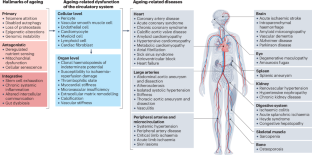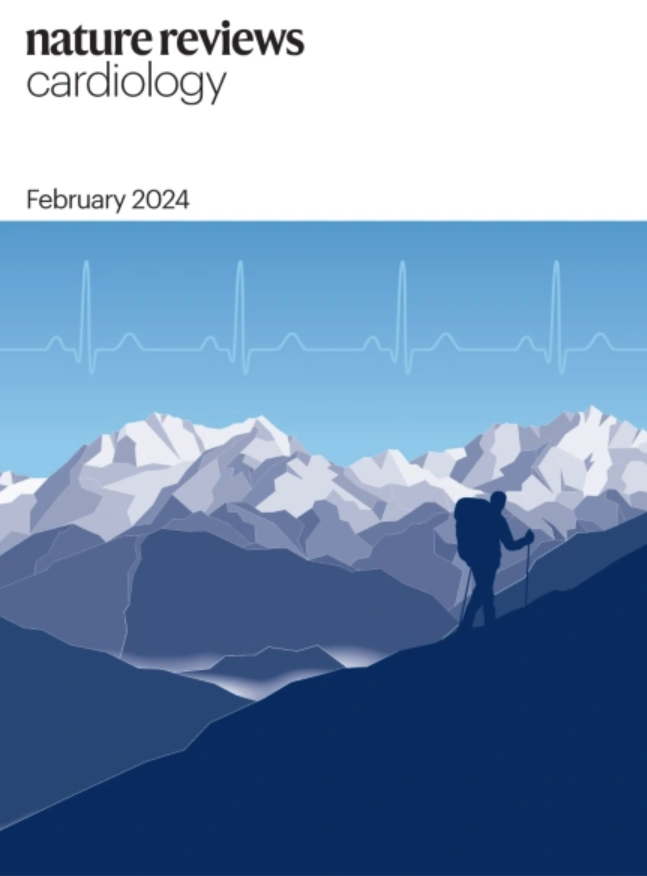缓解心血管系统老化表现的路线图
IF 44.2
1区 医学
Q1 CARDIAC & CARDIOVASCULAR SYSTEMS
引用次数: 0
摘要
心血管系统的老化与身体虚弱和各种危及生命的疾病有关。随着全球人口老龄化,与年龄相关的疾病越来越多地决定着健康寿命和寿命。循环系统不仅为人体的所有组织提供营养和氧气,清除副产品,而且还建立了最大的器官间通信网络,从而成为健康衰老的守门人。因此,阐明损害循环系统功能的器官特异性和细胞特异性衰老机制可能有可能预防或改善与年龄相关的心血管疾病。为了支持这一概念,新出现的证据表明,以循环系统为目标可能会恢复器官功能。在本路线图中,我们深入研究了心血管系统中与衰老相关的变化背后的器官特异性和细胞特异性机制。我们提出了关于临床试验的最佳设计的悬而未决的问题,在临床试验中,人类生物衰老的标志物可以被评估。我们为老年治疗药物的发展提供指导,这将依赖于诊断工具箱的技术进步来测量老年人的剩余风险。在探索延缓人类年龄相关疾病的干预措施的过程中,一个主要挑战是确定能够延缓衰老变化发生的分子开关。为了克服这一障碍,未来的临床试验需要提供证据,证明老年治疗药物直接影响衰老的一个或几个特征,从而延缓、预防、减轻或治疗与年龄相关的功能障碍和疾病。本文章由计算机程序翻译,如有差异,请以英文原文为准。


Roadmap for alleviating the manifestations of ageing in the cardiovascular system
Ageing of the cardiovascular system is associated with frailty and various life-threatening diseases. As global populations grow older, age-related conditions increasingly determine healthspan and lifespan. The circulatory system not only supplies nutrients and oxygen to all tissues of the human body and removes by-products but also builds the largest interorgan communication network, thereby serving as a gatekeeper for healthy ageing. Therefore, elucidating organ-specific and cell-specific ageing mechanisms that compromise circulatory system functions could have the potential to prevent or ameliorate age-related cardiovascular diseases. In support of this concept, emerging evidence suggests that targeting the circulatory system might restore organ function. In this Roadmap, we delve into the organ-specific and cell-specific mechanisms that underlie ageing-related changes in the cardiovascular system. We raise unanswered questions regarding the optimal design of clinical trials, in which markers of biological ageing in humans could be assessed. We provide guidance for the development of gerotherapeutics, which will rely on the technological progress of the diagnostic toolbox to measure residual risk in elderly individuals. A major challenge in the quest to discover interventions that delay age-related conditions in humans is to identify molecular switches that can delay the onset of ageing changes. To overcome this roadblock, future clinical trials need to provide evidence that gerotherapeutics directly affect one or several hallmarks of ageing in such a manner as to delay, prevent, alleviate or treat age-associated dysfunction and diseases. In this Roadmap, Stellos and colleagues discuss the mechanisms of cardiovascular system ageing and how the ageing of blood, vessels and heart relates to the decline in organ function, and highlight potential therapeutic interventions, challenges in ageing research and future directions for preclinical and clinical studies.
求助全文
通过发布文献求助,成功后即可免费获取论文全文。
去求助
来源期刊

Nature Reviews Cardiology
医学-心血管系统
CiteScore
53.10
自引率
0.60%
发文量
143
审稿时长
6-12 weeks
期刊介绍:
Nature Reviews Cardiology aims to be the go-to source for reviews and commentaries in the scientific and clinical communities it serves. Focused on providing authoritative and accessible articles enriched with clear figures and tables, the journal strives to offer unparalleled service to authors, referees, and readers, maximizing the usefulness and impact of each publication. It covers a broad range of content types, including Research Highlights, Comments, News & Views, Reviews, Consensus Statements, and Perspectives, catering to practising cardiologists and cardiovascular research scientists. Authored by renowned clinicians, academics, and researchers, the content targets readers in the biological and medical sciences, ensuring accessibility across various disciplines. In-depth Reviews offer up-to-date information, while Consensus Statements provide evidence-based recommendations. Perspectives and News & Views present topical discussions and opinions, and the Research Highlights section filters primary research from cardiovascular and general medical journals. As part of the Nature Reviews portfolio, Nature Reviews Cardiology maintains high standards and a wide reach.
 求助内容:
求助内容: 应助结果提醒方式:
应助结果提醒方式:


